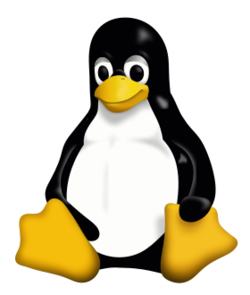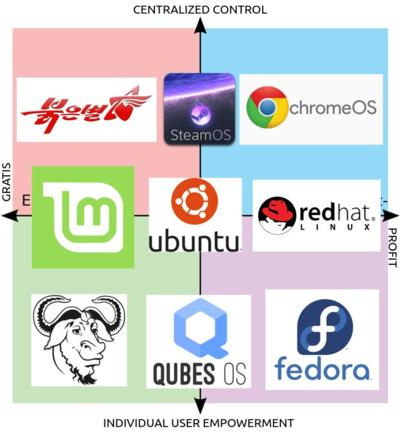Difference between revisions of "Linux"
(Unstub) |
(S. Korea) |
||
| Line 13: | Line 13: | ||
The project arose from the fusion of [[Richard Stallman]]'s work creating the [[GNU Project]] and [[Linus Torvalds]]' work on an open source kernel.<ref>http://www.unwelcomeguests.net/060_-_Mutual_Aid:_Principles_and_Practice_(from_Free_Software_to_Social_Centers)</ref> | The project arose from the fusion of [[Richard Stallman]]'s work creating the [[GNU Project]] and [[Linus Torvalds]]' work on an open source kernel.<ref>http://www.unwelcomeguests.net/060_-_Mutual_Aid:_Principles_and_Practice_(from_Free_Software_to_Social_Centers)</ref> | ||
| − | |||
| − | |||
| − | |||
==Distros== | ==Distros== | ||
[[image:linux distros.png|400px|left]] | [[image:linux distros.png|400px|left]] | ||
Many different distributions have evolved, which vary in target audience, capabilities and business model. Many are freely available.<ref>http://distrowatch.org</ref> | Many different distributions have evolved, which vary in target audience, capabilities and business model. Many are freely available.<ref>http://distrowatch.org</ref> | ||
| + | |||
| + | ==Uptake== | ||
| + | Corporations were initially wary of the free status of Linux, but its perceived reliability countered that. In 2020 the [[South Korea]]n government announced plans to switch all 3.3 million of its computers to Linux.<ref>https://www.fosslinux.com/29117/south-korea-switching-their-3-3-million-pcs-to-linux.htm</ref> | ||
==Security== | ==Security== | ||
Revision as of 06:13, 18 February 2020
(Operating system) | |
|---|---|
 | |
| Start | 1991-09-17 |
| The world's most popular open source operating system. | |
Linux is the world's most popular open source operating system. It is widely used where reliability or flexibility is an advantage, such as for server farms, custom hardware or embedded systems.
Contents
Origins
The project arose from the fusion of Richard Stallman's work creating the GNU Project and Linus Torvalds' work on an open source kernel.[1]
Distros
Many different distributions have evolved, which vary in target audience, capabilities and business model. Many are freely available.[2]
Uptake
Corporations were initially wary of the free status of Linux, but its perceived reliability countered that. In 2020 the South Korean government announced plans to switch all 3.3 million of its computers to Linux.[3]
Security
Linux is generally agreed to be more secure than Windows[citation needed], although zero day exploits do exist.[4]
